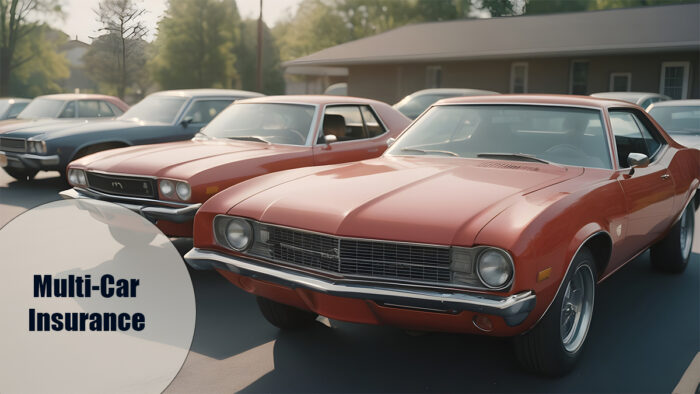If you already have a car and you are searching for another car to buy or your family or partner is moving in together, did you know that you can save more on multi-car insurance? With this type of insurance policy, you can both insure your car under a single policy.

What’s more, multi-car insurance is also known as multi-vehicle insurance, and many insurance companies offer this type of insurance policy. Questions related to how it works, what it covers, and how to apply will be answered. Keep reading if I have your attention.
What is Multi-Car Insurance?
Multi-car insurance is a type of insurance policy that covers more than one vehicle in one policy. It is specifically designed for homes with more than one car or vehicle, and it also provides a convenient and inexpensive way to manage car insurance for all drivers and cars under one roof.
These policies are accessible through most insurance companies and usually come with discounts. Thus, if you have a policy, you can save more and pay less on your car insurance premium.
However, the rules guiding this type of insurance differ from one insurance company to another. Hence, if you own more than one vehicle that is under the same address, you add them to one policy.
How Does It Work?
Well, the procedure is quite similar; the only difference is that each car on your policy will have the same coverage. For a better understanding, here is what you need to know: The liability coverage limits, which are for both property damage and bodily damage, as well as the uninsured motorist coverage limits you select, will be applied to each car you list on your quote.
Therefore, the same goes for each car. However, certain coverages are implemented per vehicle. For example, collision coverage, comprehensive coverage, rental car reimbursement, and gap insurance. In other words, you will be getting full coverage on one car but not the other. Since collision and comprehensive coverage are per vehicle, you can set your deductibles differently.
Nevertheless, the claim filing process works the same no matter how many cars you have on your policy. The only thing is that you will need to specify which vehicle was involved in the accident when you first file a claim.
What Does Multi-Car Insurance Cover?
Here are some of the inclusions in multi-car insurance, but the coverage options also differ among insurance companies, so remember:
- Collision insurance
- Liability insurance
- Comprehensive insurance
- Personal injury protection
- Roadside assistance
- Medical payments
- Rental car coverage
There are also other optional coverages, like property damage liability and bodily injury liability, that you can include in your policy.
What Does It Not Cover?
Although the exclusions of coverage on multi-car insurance depend on the insurance provider, here are some common scenarios in which this insurance policy type will not extend coverage:
- Driving abroad
- Wear and tear
- Policy limits
- Personal belongings
- Commercial use
- Uninsured drivers
- Certain drivers
- Intentional damage
This is why you need to go through your policy’s terms and documents to find out where you will be getting coverage and not.
Why Get This Policy?
What do I benefit from when I get a multi-car insurance policy? When you insure more than one car with a single policy, there are different benefits that you get. They include:
- Stacked insurance coverage
- Low deductibles
- Wider coverage
Although there are drawbacks involved with multi-car insurance, like limited access to discounts and higher rates, purchasing this type of insurance is so worth it.
How Much Does Multi-Car Insurance Cost?
The average cost of purchasing or getting a multi-car insurance policy is $237 per month, and for a quote that covers two cars, that is $2,839 per year. This is more expensive than insuring a single car, which is $1,201, an increase of 73%. However, the rates you get for a multi-car insurance policy differ depending on different things.
For instance:
- Driving history.
- Make and model the cars you want to insure.
- Driver’s gender.
- Credit scores.
- Martial status.
Additionally, the insurance company you are buying a quote from.
How to Get Multi-Car Insurance
If you want a multi-car insurance policy but already have car insurance, do not worry because including or adding a second or third car to your policy is possible and simple. Besides, you can do it online or over the phone. But if you are looking for a new policy, here is how to choose the best insurance quote to purchase and company to use:
- Decide on how much coverage you want to get.
- Prepare your information and keep it handy.
- Gather different policies.
- This process is also possible online and over the phone.
- Select a quote.
- Select the company that provides the most coverage at the best price for you.
- Cancel your old car insurance quote if you are changing companies.
During this process, ensure that your existing policy comes to an end before the new one begins, and that is it.
FAQs
Who Is Eligible for Multi-Car Insurance?
Generally, anyone who lives at the same address and owns multiple cars can take out a multi-car insurance policy. This can include family members, couples, roommates, or even friends, depending on the insurer’s criteria.
Can I Add Cars at Different Times?
Yes, most insurers allow you to add cars to the policy at different times. Your insurer may prorate your premium or adjust your policy term so that all vehicles renew at the same time, simplifying the renewal process.
Do All Cars Have to Have the Same Level of Coverage?
No, each car on a multi-car insurance policy can have different levels of coverage. For example, you might choose comprehensive coverage for a new car and third-party, fire, and theft coverage for an older model.
How Are Claims Handled with Multi-Car Insurance?
Claims are handled individually for each car. If one car is involved in an accident, it only affects the no-claims bonus (NCB) for that specific vehicle, not all cars on the policy. However, policies can vary, so it’s important to check the details with your insurer.


